Egypt. Sudanese turned back at the border.

From a country at war to a hostile one: the testimony of those who live in limbo between discrimination, arbitrary arrests and forced repatriations. Integration is difficult in a society that shows it does not want those who flee from the neighbouring country.
“It all started suddenly. The arrival of the war was a shock for us – the treatment of the Janjawid militias, the thefts in our homes. Nothing was safe. We were constantly terrified.” Ghofran speaks, looking at her hands. She is 26 years old, with a blue veil enveloping her beautiful face, and her dark eyes move quickly from one point to another in the room. With her composed and shy manner, she recounts how she arrived in Egypt from Sudan, fleeing an atrocious conflict that began without any warning. “Coming to Egypt seemed like a good idea to us,” Ghofran continues, “but life here is difficult too, because we don’t feel safe in this country either. Plus, we don’t have a stable job, we can’t study, we can’t do any of the things we did before.”
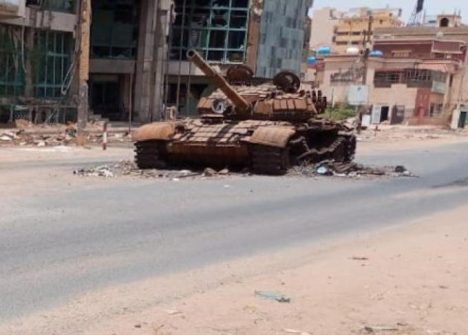
Fighting broke out in Khartoum on 15 April 2023, turning the capital into a battlefield. File swm
When the war broke out in Sudan on April 15, 2023, no one expected it. It was Eid, the holiday at the end of Ramadan, and all the families were gathered to celebrate. Mortars began to be heard in the streets, and no one knew what was happening. Some of them even joked that a war was coming. Then the attacks by the Rapid Support Forces (RSF), the Janjawid, began, looting apartments, shops, and even museums. Without mercy, they executed civilians in the streets and forced people to give them everything. The country immediately fell into a stalemate, and food and medicine were no longer available. The Sudanese had to flee: some from one part of the country to another, some to neighbouring countries. In two years, about 12.4 million people were forced to leave their homes and head for Chad, Nigeria, or Cameroon. One million, two hundred thousand Sudanese poured into Egypt, hoping to find safety and comfort. Sudan’s is a forgotten war, which has quickly become one of the worst humanitarian catastrophes in recent years.
Telling of an escape
In a living room filled with a thick fog of incense, a traditional practice to ward off the evil eye, Ghofran continues her story, while her sister and two cousins gather around her and listen in silence: “We arrived clandestinely, with the traffickers. It’s dangerous because all of this is illegal; if they find us, they’ll arrest us. We spent two days in the desert; we travelled in a truck. We wanted to take food with us, but the driver didn’t allow us, and so we didn’t have enough for the whole trip. That was the hardest thing. Then the truck broke down, and we had to stop at least two or three times. We also travelled during the day, under the sun. It was so hot. And in the middle of the desert, we had to wait for hours for them to fix the truck.”
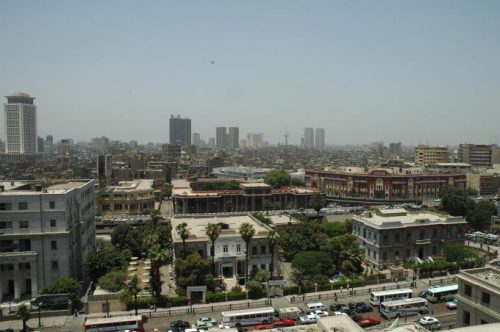
Cairo. “We arrived clandestinely. If they find us, they’ll arrest us.” File swm
After the war began, Ghofran and her family stayed more than a year in Khartoum, the capital. Then their mother got sick and, unable to find doctors and medicine to treat her, the women decided to travel, taking their children with them. They started moving toward the north of the country, by bus to the border, where, paying just over a thousand dollars, they began crossing the desert. They crossed the border with Egypt at night, in secret. They then arrived in Aswan, a famous tourist city in the south of the country, and from there they took another bus to Cairo. The trip, in all, lasted just over two weeks. Now they live in the house of one of her aunts, and Ghofran makes ends meet by working in a call centre while studying English. She desires to go to Canada or Germany, where she has heard life is better. A graduate in economics from the University of Khartoum, she intends to win a scholarship that will allow her to study for a master’s degree in business management.
Discrimination and fear
Life in Cairo, unfortunately, has been more difficult than expected and has not given her the protection and tranquillity she wanted. Her safe place is the apartment where she lives with her aunt, sister and cousins, while her mother and another sister live separately. But once she crosses the threshold of her home, like many other Sudanese, she describes a daily life made up of discrimination and fear:
“We feel threatened on the street. We are harassed, they try to rob us, or they insult us as we walk along. I don’t feel safe when I’m out. I don’t even like going to the market.”
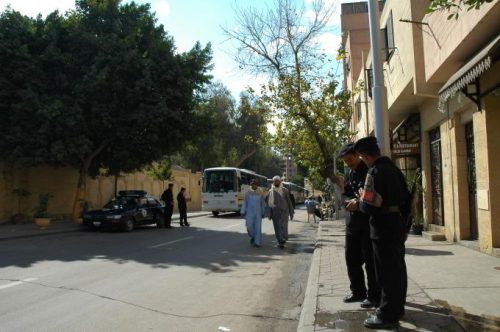
Cairo. Police in the streets of the capital. The Egyptian government is restricting access and sending back Sudanese people, even those with valid immigration permits. File swm
Despite the difficulties, Sudanese come together, creating communities and helping each other. Ghofran’s situation is similar to that of many others: living in fear affects their mental health, already affected by war and flight. They exist in a limbo, suspended between the desire to return home and the need to create an alternative for survival. Unable to find a sense of belonging, they find it difficult to integrate into a society that shows it does not want them. Ghofran concludes his story by telling what happened to one of her relatives: “My cousin had a car accident some time ago. He went to the hospital to get treatment. Shortly after he was there, the police arrived and arrested him. They kept him in prison for a few days and then sent him back to Sudan, saying it was a voluntary repatriation. But we know that is not true. It was a difficult situation and it traumatised us; now we are afraid even to go to the market or the hospital, fearing the same thing will happen to us. He was legal, he even had a refugee card.”
A broken accord
What Ghofran’s family experienced is not an isolated case. When the conflict began, tens of thousands of Sudanese citizens decided to leave the country immediately. At the time, it was relatively easy. The journey was long, on buses that cost up to $200 to the border with Egypt. There were long lines to go through border control, and then back on the bus to Cairo or elsewhere. A Sudanese person, theoretically, would not need a visa to come to Egypt, nor a residence permit to settle in the country. This is because the Four Freedoms Agreement applies between Sudan and Egypt. Signed in 2004, the agreement allows citizens of both nations to move freely, reside, work and own property of various kinds. Within weeks of the influx of refugees, which continued to increase, the Egyptian government began to change the rules for crossing the border.
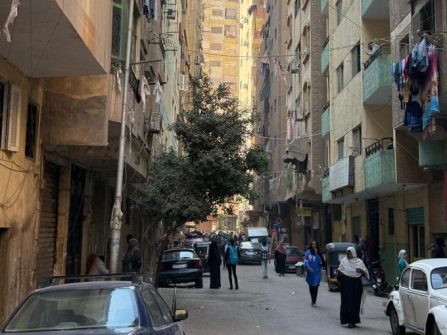
The Faisal neighbourhood in Cairo, where many Sudanese refugees live. Photo: Daniel P. Sullivan/Refugees International.
“From the second week onwards, we started to monitor and document how the Egyptian side was behaving with the movements of people coming from Sudan, thinking it would probably be a long conflict with more and more displaced people,” explains Nour Khalil. Nour is an activist exiled in Italy and founder of the “Platform of Refugees in Egypt”, an independent organisation that monitors, documents and reports human rights violations. “As a first move,” he told us, “The government started to require, for example, visas from minors under 16 and people over 50, for whom it was not necessary before. Then they no longer accepted “urgent travel” documents. We reached a point where the border authorities declared that everyone, without distinction, needed a visa to enter the country.” The visa offices are in Halfa, hundreds of kilometres from the border, and people were stuck in an area with no services and limited ability to move.
Left to suffer
The new restrictions forced people to turn to people-smugglers to escape, creating an organisation worth hundreds of thousands of dollars. Soon after, the Ministry of the Interior began implementing a nationwide system of arbitrary arrests and repatriations. Many have reported Sudanese being stopped while simply walking on the street or celebrating the liberation of one of Sudan’s cities.
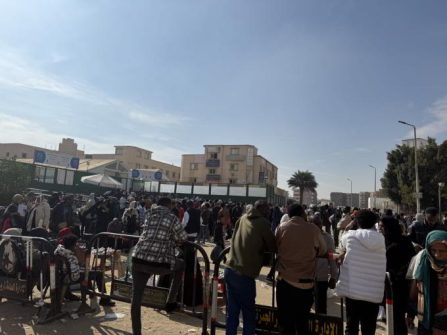
Sudanese asylum seekers gather outside of the UNHCR office in Cairo. Photo: Devon Cone/Refugees International.
“For more than a year, we have conducted a thorough work of cross-investigation, comparing internal government documents, testimonies from border guards and hundreds of people arrested and deported, corroborating the data collected with satellite images and using lawyers who are experts in international law,” Nour says. “We have learned that the Egyptian government is carrying out a nationwide operation aimed at restricting access and sending back Sudanese, even those with valid immigration permits.”
Prisons in military bases
The investigation conducted by the activists of the “Platform” has also ascertained the presence of more than six military bases used for detention purposes: an operation that is not only against Egyptian law, but also violates international law. To identify refugees, checkpoints have been implemented at train stations, bus stations and on the roads. The military bases its decision on whether to stop a person or not on the basis of skin colour. “Despite the commitment declared in the past to participate in international agreements to protect refugees, the Egyptian government has responded to this new migratory flow by tightening restrictions on entry, stay and the methods of granting refugee status,” concludes Nour. (Open Photo: 123rf)
Ines Della Valle



